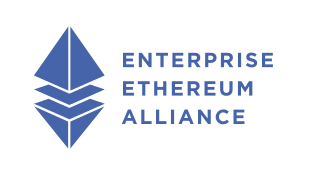Enterprise Ethereum Alliance Announces Support for Blockchain Consensus Algorithm Integration
July 7, 2017
WAKEFIELD, Mass., USA – July 5, 2017 – The Enterprise Ethereum Alliance (EEA) announced today its support for the first integration of Practical Byzantine Fault Tolerant (PBFT) consensus with J.P. Morgan’s Quorum Blockchain Platform. The implementation was performed by AMIS, a joint venture of major financial institutions in Taiwan in a partnership with J.P Morgan, one of the world’s largest banks. Both AMIS and J.P. Morgan are members of EEA.
“This is significant advancement in providing enterprises a range of ‘pluggable’ consensus algorithms, which is a core objective of the EEA,” said Julio Faura, chairman of the board, Enterprise Ethereum Alliance. “We are proud to see EEA members such as AMIS not only contributing in such a meaningful way, but also in collaboration with other members such as J.P. Morgan. Enterprise adoption of Ethereum has never been stronger, and is getting stronger everyday through efforts like these.”
EEA is a non-profit industry organization that defines standards so application built on an Ethereum-derived platform will run on all Ethereum platforms as well as supporting the development of enterprise tools and support. PBFT is the latest option added to Quorum and
helps solve the challenge of maintaining truthful transactions in a blockchain’s decentralized system.
“AMIS’s integration of PBFT into J.P. Morgan’s Quorum using geth’s new pluggable consensus interface serves as a great example of how EEA is enabling collaboration across enterprise and public Ethereum communities,” said Alex Batlin, global head of emerging business & technology and global blockchain lead at BNY Mellon.
Quorum, created by J.P. Morgan, is an open source enterprise block chain platform built on the public Ethereum project that protects data in the enterprise but remains open and flexible for future integration and innovation.
- Learn more about EEA and Ethereum
- Sign-up to receive the latest EEA information
- Join the over 100 members of EEA
The Enterprise Ethereum Alliance was formed earlier this year seeking to evolve Ethereum so that it can serve as an enterprise-grade technology. EEA’s research and development is focused on privacy, confidentiality, scalability and security. EEA investigates hybrid architectures that span both permissioned and pubic Ethereum networks and industry specific application layer working groups.
About The Enterprise Ethereum Alliance (EEA)
EEA collectively develops industry standards and facilitates open source collaboration with its member base and is open to any members of the Ethereum community who wish to participate. This collaborative framework will enable the mass adoption at a depth and breadth otherwise unachievable in individual corporate silos and provide insight to the future of scalability, privacy and confidentiality of the public Ethereum permissionless network. For more information: [email protected]

